【英语】英语语法情景交际归纳总结
- 格式:doc
- 大小:71.00 KB
- 文档页数:9
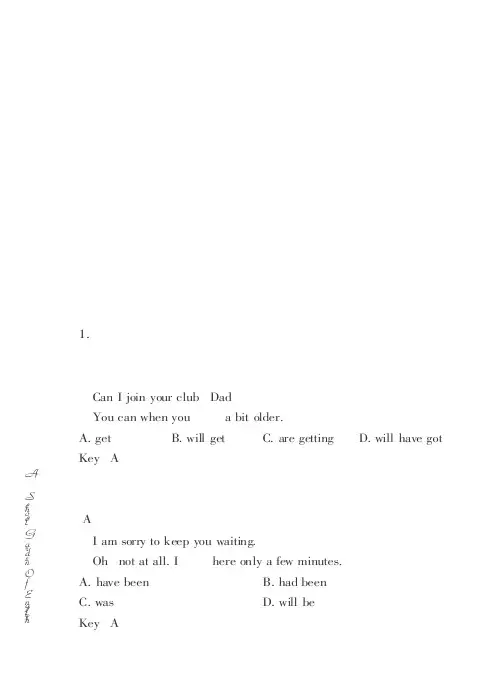
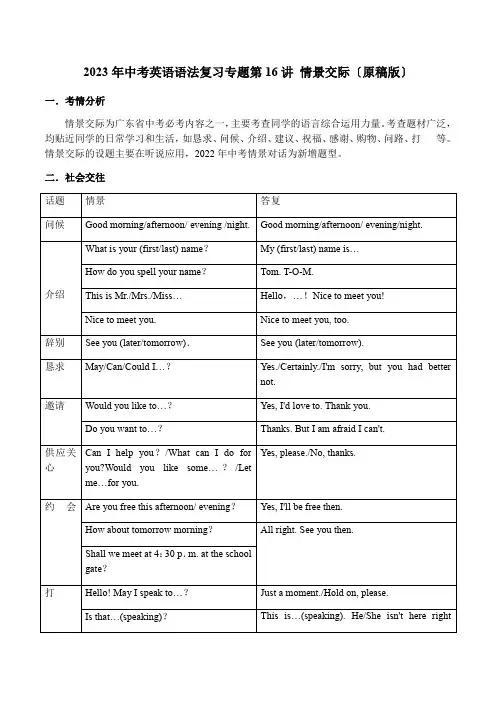
2023年中考英语语法复习专题第16讲情景交际〔原稿版〕一.考情分析情景交际为广东省中考必考内容之一,主要考查同学的语言综合运用力量。
考查题材广泛,均贴近同学的日常学习和生活,如恳求、问候、介绍、建议、祝福、感谢、购物、问路、打等。
情景交际的设题主要在听说应用,2022年中考情景对话为新增题型。
二.社会交往三.情感和态度留意:在听说应用中,说话者会用感慨词表达喜悦、惊异、苦痛等情感。
它不构成句子中的语法成分,却在意义上与句子有关联。
四.时间和空间五.情景交际在听说应用中的运用分析广东省卷近5年中考真题可知,情景交际主要在听说应用的听对话题型中考查,2022年增加了情景对话的题型。
常考的考点有社会交往、情感和态度、时间和空间。
在做题时,同学要留意听力材料中关于情景交际的对话。
1. 社会交往。
(1)邀请。
(6年1考)(2022广东省卷新增题型:情景对话)Ann: I'll stay at home. 26. ___________________________Tom: I will have a picnic in a park with some friends.Ann: 27. ___________________________________Tom: No. We'll go to Zhongshan Park.Ann: Have you checked the weather report?Tom: Yes. It'll be sunny. 28. ______________________________Ann: I'd love to, but I have to finish a school report.Tom: What a pity! 29. ________________________Ann: OK. 30. ________________________Tom: Thank you.留意:2022年情景对话题型针对情景交际设题,对话一般为5-5.5个回合,要求同学从六个选项中选出五个正确选项。
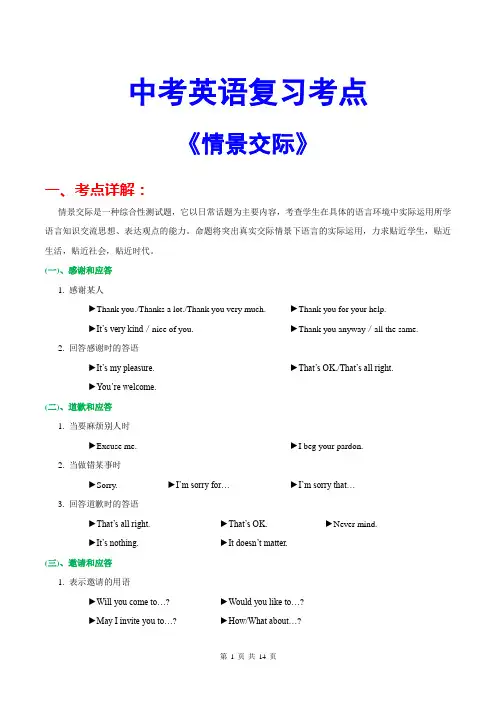
中考英语复习考点《情景交际》一、考点详解:情景交际是一种综合性测试题,它以日常话题为主要内容,考查学生在具体的语言环境中实际运用所学语言知识交流思想、表达观点的能力。
命题将突出真实交际情景下语言的实际运用,力求贴近学生,贴近生活,贴近社会,贴近时代。
(一)、感谢和应答1. 感谢某人►Thank you./Thanks a lot./Thank you very much. ►Thank you for your help.►It’s very kind/nice of you. ►Thank you anyway/all the same.2. 回答感谢时的答语►It’s my pleasure.►That’s OK./That’s all right.►You’re welcome.(二)、道歉和应答1. 当要麻烦别人时►Excuse me. ►I beg your pardon.2. 当做错某事时►Sorry. ►I’m sorry for…►I’m sorry that…3. 回答道歉时的答语►That’s all right.►That’s OK. ►Never mind.►It’s nothing.►It doesn’t matter.(三)、邀请和应答1. 表示邀请的用语►Will you come to…? ►Would you like to…?►May I invite you to…? ►How/What about…?2. 接受邀请时的答语►Yes, I’d like /love to.►Yes. It’s very kind of you.►That would be nice.3. 拒绝邀请时的答语►No, thank you. ►I’d love /like to,but…(四)、请求和应答1. 表请求用语►May I…? ►Can/Could I…? ►Would you mind if…?2. 表肯定的答语►Sure. /Certainly. ►Yes, do please.►That’s all right.►Of course, you can.3. 表否定的答语►I’m afraid not.►I’m sorry, but you mustn’t/can’t.►You’d better not.(五)、祝愿、祝贺和应答1. 祝贺用语►Have a good day/time! ►Have a good journey/trip!►Good luck! ►Enjoy yourself!►Best wishes to you! ►Happy New Year!►Merry Christmas! ►Happy birthday!►Congratulations! ►Well done!2. 应答用语►Thank you. ►You, too. ►The same to you.(六)、提供帮助和应答1. 提供帮助►Can I help you? ►Would you like me to help you?►What can I do for you? ►Let me help you.2. 肯定答语►Yes, please./Yes, thanks. ►Thank you for your help.►Thank you. ►That would be nice.3. 否定答语►No, thanks/thank you. ►That’s very kind/nice of you, but I can manage it myself.(七)、劝告和建议►You’d better…►Why not…?►How/What about…? ►Shall we…? ►You shouldn’t…(八)、打电话1. 拨电话方的交际用语►Could/May/Can I speak to...please? ►Who’s that(speaking)?►This is…(speaking). ►Could you ask him/her to call me back?►I’m calling to tell/ask you to…2. 接电话方的交际用语►Hold on(for a moment), please.►I’m sorry/afraid he’s/she’s out at the moment/right now.►Can I take a message (for you)?(九)、购物1. 营业员常用的交际用语►CanI help you?/What can I do for you? ►How many/much… do you want?►What about this one? ►What colour/size/kind do you like/want?►I’m afraid we haven’t got any…in that siz e at the moment.►Here you are.2. 顾客常用的交际用语►I want /would like to buy some. . . (for. . . ) ►I’m looking for. . .►I would like/want two kilos of... ►I like the colour,but it’s/they’re too. . .►It’s great,but it’s not. . . enough.►Have you got any other kind/colour/size?►That looks nice/great. ►Have you got anything cheaper?►How much does it cost? ►Can/May I try them/it on,please?(十)、看病1. 医生常用交际用语►What’s wrong with you? /What’s tihe matter?/What’s up?►How long have you been like this? ►Have you taken your temperature?►Have you had anything to eat this morning?►There’s nothing serious.►Take this medicine and stay in bed for a few days.►You will get better soon. ►You will be all right/well soon.2. 病人常用的交际用语►I have got a headache/cough.►I’m not feeling well./l don’t feel very well./I feel terrible►There’s something wrong with...(十一)、情感1. 高兴►How wonderful/nice! ►That’s lovely/great/wonderful!►I’m pleased to know that.2. 惊奇►Really? ►Oh dear!►Is that so? ►What a surprise!►How nice to see you! ►How surprising!►I’m surprised.3. 满意►Good! ►Well done! ►Perfect!►That’s fine.►That’s better.►That’s good enough.4. 忧虑►What’s wrong?►What’s the matter?►Anything wrong? ►What should we do?5. 遗憾与同情►I’m so sorry!►It’s a great pity!►What a shame/pity! ►That’s too bad!►I’m sorry to hear that.二、分法技巧:情景交际题之解题思路要做好这类题目,关键是平时要养成讲英语的良好习惯,努力提高口语水平,熟练掌握日常会话项目中常用的问答语。
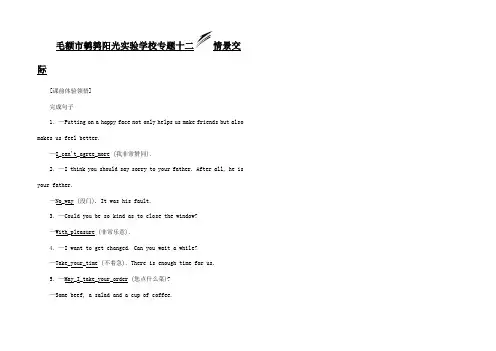
毛额市鹌鹑阳光实验学校专题十二情景交际[课前体验领悟]完成句子1.—Putting on a happy face not only helps us make friends but also makes us feel better.—I_can't_agree_more (我非常赞同).2.—I think you should say sorry to your father. After all, he is your father.—No_way (没门). It was his fault.3.—Could you be so kind as to close the window?—With_pleasure (非常乐意).4.—I want to get changed. Can you wait a while?—Take_your_time (不着急).There is enough time for us.5.—May_I_take_your_order (您点什么菜)?—Some beef, a salad and a cup of coffee.[课堂考前讲练]社会交往1.感谢和应答(Thanks and responses)感谢的表达法几乎用于一切场合,家人之间、陌生人之间、师生之间等,哪怕是一件小事情,甚至是理所当然的事,也得说声谢谢。
感谢与应答常用以下句式:①Thank you (very much)./Thanks a lot./Many thanks./Thanks for .../I really don't know how I can thank you enough./It's very kind of you to ...②Not at all./It's/That's all right (OK)./You're welcome./I'm very glad you enjoyed it./It's a pleasure./My pleasure./Please don't mention it./It was nothing.—I'm sorry I didn't finish it on time.—Thanks anyway.(2011·四川高考)——抱歉我没能准时完成。
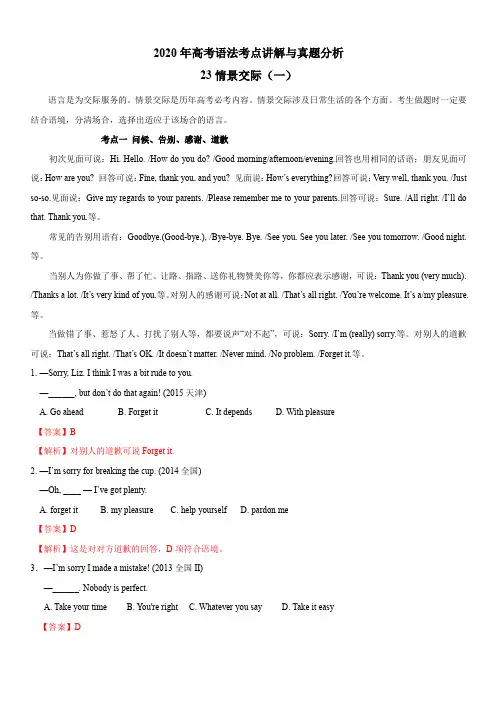
2020年高考语法考点讲解与真题分析23情景交际(一)语言是为交际服务的。
情景交际是历年高考必考内容。
情景交际涉及日常生活的各个方面。
考生做题时一定要结合语境,分清场合,选择出适应于该场合的语言。
考点一问候、告别、感谢、道歉初次见面可说:Hi. Hello. /How do you do? /Good morning/afternoon/evening.回答也用相同的话语;朋友见面可说:How are you? 回答可说:Fine, thank you, and you? 见面说:How’s everything?回答可说:Very well, thank you. /Just so-so.见面说:Give my regards to your parents. /Please remember me to your parents.回答可说:Sure. /All right. /I’ll do that. Thank you.等。
常见的告别用语有:Goodbye.(Good-bye.), /Bye-bye. Bye. /See you. See you later. /See you tomorrow. /Good night.等。
当别人为你做了事、帮了忙、让路、指路、送你礼物赞美你等,你都应表示感谢,可说:Thank you (very much). /Thanks a lot. /It’s very kind of you.等。
对别人的感谢可说:Not at all. /That’s all right. /You’re welcome. It’s a/my pleasure.等。
当做错了事、惹怒了人、打扰了别人等,都要说声“对不起”,可说:Sorry. /I’m (really) sorry.等。
对别人的道歉可说:That’s all right. /That’s OK. /It doesn’t matter. /Never mind. /No problem. /Forget it.等。
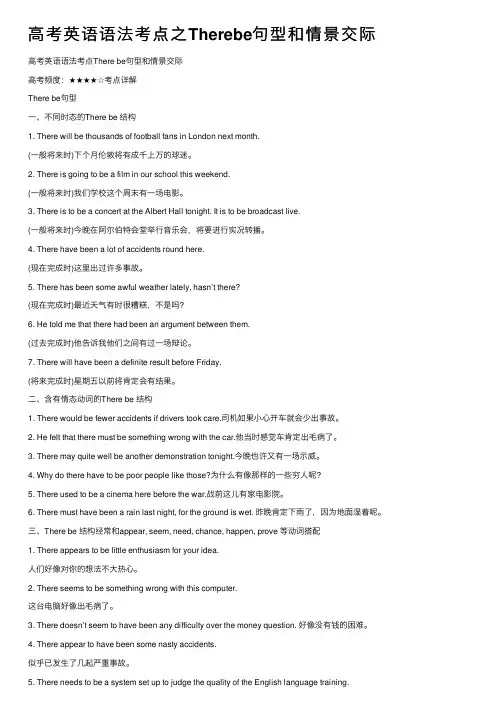
⾼考英语语法考点之Therebe句型和情景交际⾼考英语语法考点There be句型和情景交际⾼考频度:★★★★☆考点详解There be句型⼀、不同时态的There be 结构1. There will be thousands of football fans in London next month.(⼀般将来时)下个⽉伦敦将有成千上万的球迷。
2. There is going to be a film in our school this weekend.(⼀般将来时)我们学校这个周末有⼀场电影。
3. There is to be a concert at the Albert Hall tonight. It is to be broadcast live.(⼀般将来时)今晚在阿尔伯特会堂举⾏⾳乐会,将要进⾏实况转播。
4. There have been a lot of accidents round here.(现在完成时)这⾥出过许多事故。
5. There has been some awful weather lately, hasn’t there?(现在完成时)最近天⽓有时很糟糕,不是吗?6. He told me that there had been an argument between them.(过去完成时)他告诉我他们之间有过⼀场辩论。
7. There will have been a definite result before Friday.(将来完成时)星期五以前将肯定会有结果。
⼆、含有情态动词的There be 结构1. There would be fewer accidents if drivers took care.司机如果⼩⼼开车就会少出事故。
2. He felt that there must be something wrong with the car.他当时感觉车肯定出⽑病了。
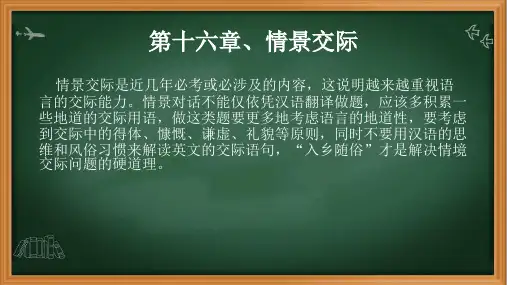
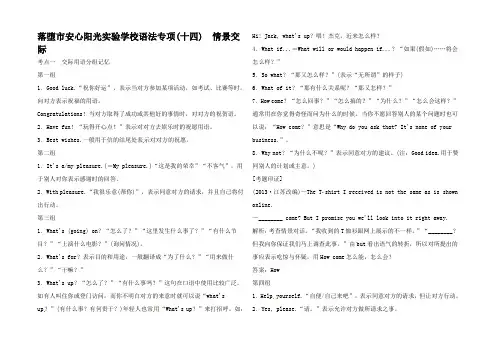
落堕市安心阳光实验学校语法专项(十四) 情景交际考点一交际用语分组记忆第一组1.Good luck.“祝你好运”,表示当对方参加某项活动,如考试、比赛等时,向对方表示祝福的用语。
Congratulations!当对方取得了成功或其他好的事情时,对对方的祝贺语。
2.Have fun!“玩得开心点!”表示对对方去娱乐时的祝愿用语。
3.Best wishes.一般用于信的结尾处表示对对方的祝愿。
第二组1.It's a/my pleasure.(=My pleasure.)“这是我的荣幸”“不客气”,用于别人对你表示感谢时的回答。
2.With pleasure.“我很乐意(帮你)”,表示同意对方的请求,并且自己将付出行动。
第三组1.What's (going) on?“怎么了?”“这里发生什么事了?”“有什么节目?”“上演什么电影?”(询问情况)。
2.What's for?表示目的和用途,一般翻译成“为了什么?”“用来做什么?”“干嘛?”3.What's up?“怎么了?”“有什么事吗?”这句在口语中使用比较广泛。
如有人叫住你或登门访问,而你不明白对方的来意时就可以说“what's up?”(有什么事?有何贵干?)年轻人也常用“What's up?”来打招呼。
如:Hi! Jack, what's up?喂!杰克,近来怎么样?4.What if...=What will or would happen if...?“如果(假如)……将会怎么样?”5.So what?“那又怎么样?”(表示“无所谓”的样子)6.What of it?“那有什么关系呢?“那又怎样?”7.How come?“怎么回事?”“怎么搞的?”“为什么?”“怎么会这样?”通常用在你觉得奇怪而问为什么的时候。
当你不愿回答别人的某个问题时也可以说:“How come?”意思是“Why do you ask that? It's none of your business.”。
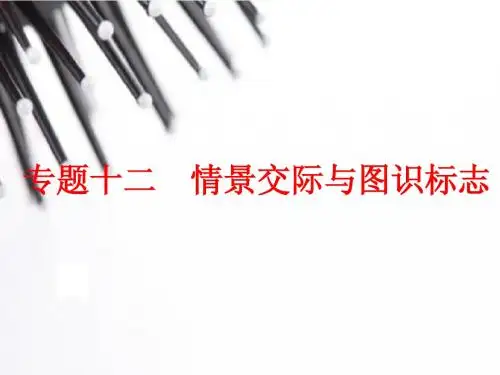
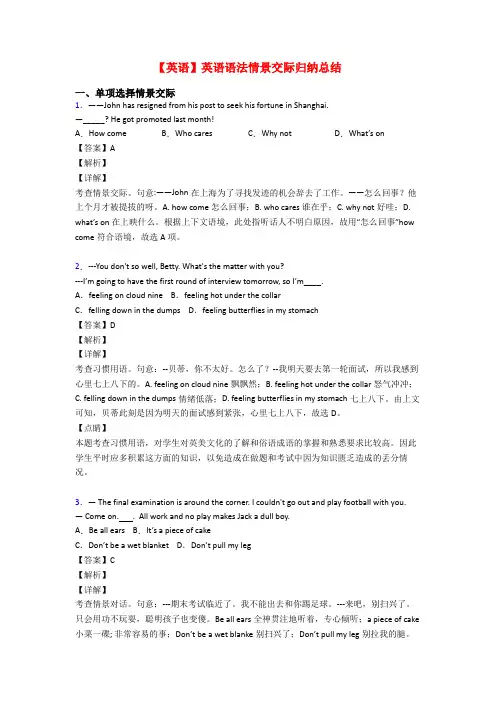
【英语】英语语法情景交际归纳总结一、单项选择情景交际1.——John has resigned from his post to seek his fortune in Shanghai.―_____? He got promoted last month!A.How come B.Who cares C.Why not D.What’s on【答案】A【解析】【详解】考查情景交际。
句意:——John在上海为了寻找发迹的机会辞去了工作。
——怎么回事?他上个月才被提拔的呀。
A. how come怎么回事;B. who cares谁在乎;C. why not好哇;D. what’s on 在上映什么。
根据上下文语境,此处指听话人不明白原因,故用“怎么回事”how come符合语境,故选A项。
2.---You don't so well, Betty. What's the matter with you?---I’m going to have the first round of interview tomorrow, so I’m____.A.feeling on cloud nine B.feeling hot under the collarC.felling down in the dumps D.feeling butterflies in my stomach【答案】D【解析】【详解】考查习惯用语。
句意:--贝蒂,你不太好。
怎么了?--我明天要去第一轮面试,所以我感到心里七上八下的。
A. feeling on cloud nine飘飘然;B. feeling hot under the collar怒气冲冲;C. felling down in the dumps情绪低落;D. feeling butterflies in my stomach七上八下。
由上文可知,贝蒂此刻是因为明天的面试感到紧张,心里七上八下,故选D。
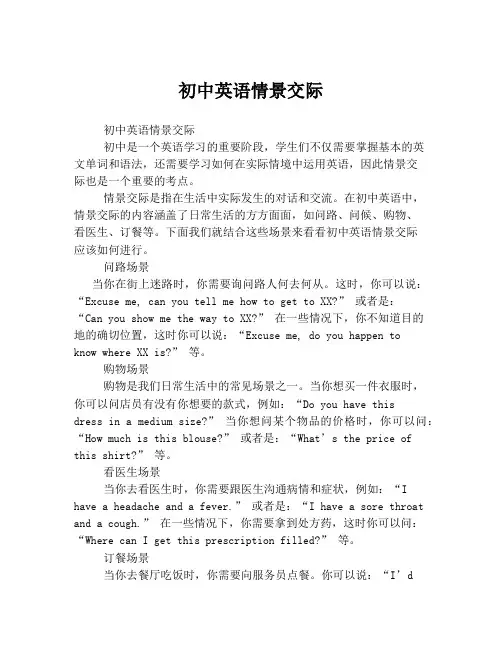
初中英语情景交际初中英语情景交际初中是一个英语学习的重要阶段,学生们不仅需要掌握基本的英文单词和语法,还需要学习如何在实际情境中运用英语,因此情景交际也是一个重要的考点。
情景交际是指在生活中实际发生的对话和交流。
在初中英语中,情景交际的内容涵盖了日常生活的方方面面,如问路、问候、购物、看医生、订餐等。
下面我们就结合这些场景来看看初中英语情景交际应该如何进行。
问路场景当你在街上迷路时,你需要询问路人何去何从。
这时,你可以说:“Excuse me, can you tell me how to get to XX?” 或者是:“Can you show me the way to XX?” 在一些情况下,你不知道目的地的确切位置,这时你可以说:“Excuse me, do you happen toknow where XX is?” 等。
购物场景购物是我们日常生活中的常见场景之一。
当你想买一件衣服时,你可以问店员有没有你想要的款式,例如:“Do you have thisdress in a medium size?” 当你想问某个物品的价格时,你可以问:“How much is this blouse?” 或者是:“What’s the price ofthis shirt?” 等。
看医生场景当你去看医生时,你需要跟医生沟通病情和症状,例如:“I have a headache and a fever.” 或者是:“I have a sore throat and a cough.” 在一些情况下,你需要拿到处方药,这时你可以问:“Where can I get this prescription filled?” 等。
订餐场景当你去餐厅吃饭时,你需要向服务员点餐。
你可以说:“I’dlike to have a hamburger and fries, please.” 当你对菜品不熟悉时,你可以问服务员:“What do you recommend?” 或者是:“What’s in this dish?” 等。
第十五章情景交际考点1. A pleasure与With pleasureA pleasure.=My pleasure=It‘s a pleasure. 意为―不用谢‖,当别人表示感谢时用它来回答With pleasure. 意为―非常乐意‖,当别人请自己帮忙时,自己爽快的接受(伴随着快乐)。
1)【1997上海】11. —Would you do me a favor and give me a ride ?— ______ .A. Yes, that‘s rightB. No troubleC. Never mindD. With pleasure2)【2003 北京春】24 --- Thanks for the lovely and delicious food .--- ___________ .A No thanksB Never mindC All rightD My pleasure3)【2005山东卷】---- Could you do me a favor and take these books to my office?---- Yes, ________.A. for pleasureB. I couldC. my pleasureD. with pleasure4)【2006浙江】 --- Would you take this along to the office for me?---______A. With pleasure.B. That‘s right.C. Never mind.D. Don‘t mentio n it.5)【2007四川】—Thank you for joining in our conversation tonight.— _______ .A.It‘s my duty B. It‘s all right C.It‘s my pleasure D It‘s nice to say so6)【09四川】9. —Would you please help me with the box ?—_________A. Yes , pleaseB. No , please don‘tC. With pleasureD. My pleasure7)【09安徽】26. -- Could you be so kind as to close the window?-- ________.A. With pleasureB. Go aheadC. Yes, pleaseD. That's OK答案: 1. D 2. D 3. D 4. A 5. C 6. C 7. A 考点2.Don’t mention it.与you’re welcome.Don’t 'mention it(informal) used as a polite answer when sb has thanked you for sth:‗Thanks for all your help.‘ ‗Don‘t mention it.‘两个短语用法较简单,意为―不用谢‖A:Thank you very much. 太感谢你了。
人教版英语九上各单元重要语法知识点在学习英语时,语法是一个非常重要的环节。
掌握好英语的语法知识,对于提高英语水平有着非常重要的作用。
下面将分别介绍人教版英语九上各单元的重要语法知识点,希望能够对大家有所帮助。
第一单元重点语法知识点:动词的时态1. 一般现在时:表示经常性或习惯性的动作,也可用于表示客观事实、真理、格言、警句等。
2. 一般过去时:表示过去某个时间发生的动作,或者过去常常发生的动作,也可用于表示过去的状态和习惯。
3. 一般将来时:表示将来某个时间将要发生的动作或情况,还可以表示计划、安排和意图等。
第二单元重点语法知识点:形容词和副词的比较级和最高级1. 形容词的比较级:在两个人或事物之间进行比较时,用来表示一个比另一个更高一些的程度。
2. 形容词的最高级:用来表示三者及三者以上的人或事物相互比较,表示最高程度。
3. 副词的比较级和最高级:和形容词的比较级和最高级用法相似,主要用于修饰动词、形容词和其他副词。
第三单元重点语法知识点:动词不定式1. 作宾语:作为动词的宾语,通常用动词不定式的基本形式。
2. 作宾语补足语:常用在某些及物动词之后,表示宾语的具体内容。
3. 作状语:通常用于说明谓语动词的动作的目的或意图。
第四单元重点语法知识点:定语从句1. 修饰名词或代词:用来对名词或代词进行修饰,一般用在被修饰的名词或代词之后。
2. 关系代词和关系副词:在定语从句中,关系代词有that, which, who, whom, whose等;关系副词有where, when, why等。
3. 关系代词和关系副词在定语从句中的使用。
第五单元重点语法知识点:情态动词1. can/could:表示能力、许可、请求;can用于一般现在时,could 用于一般过去时。
2. may/might:表示可能、许可、请求;may用于一般现在时,might用于一般过去时。
3. must:表示推测、肯定、命令等意义;只能用于一般现在时。
【精品】英语语法情景交际归纳总结一、单项选择情景交际1.—No words are strong enough to express our heartfelt thanks for your assistance.—________.A.Take it easy B.With pleasure C.It’s my pleasure D.Never mind【答案】C【解析】【详解】考查情境交际用语。
句意:——对你的帮助,我无法用言语来表达我们衷心的感谢。
——别客气。
A. Take it easy别着急;B. With pleasure我很乐意;C. It’s my pleasure不客气;D. Never mind没有关系。
结合句意故选C。
2.—Hey, do remember we are going to Mr. Black’s office tomorrow.—Oh, I have almost forgotten, but_____.A.not really B.never mindC.no problem D.no doubt【答案】C【解析】【详解】考查习惯用语。
A. not really不见得;B. never mind没关系;C. no problem没问题;D. no doubt毫无疑问。
句意:—嘿,别忘了我们明天要去布莱克先生的办公室。
—哦,我差点忘了,但是没问题。
故C选项正确。
3.We all think he is , who is not enthusiastic about anything we do.A.a black sheep B.a dark horse C.a green hand D.a wet blanket【答案】D【解析】【详解】考查习惯用法。
A. a black sheep害群之马; B. a dark horse黑马; C. a green hand新手;D. a wet blanket扫兴的人或物。
【英语】英语语法情景交际归纳总结一、单项选择情景交际1.The trip shouldn't take more than one hour.- ______. It is at least two hours.A.I couldn't agree more B.That's rightC.You must be joking D.It all depends【答案】C【解析】【详解】考查情景交际用语。
句意:——这次旅行不会超过一个小时。
——你一定是在开玩笑。
至少要两个小时。
A. I couldn't agree more我完全同意;B. That's right没错,就是那样;C. You must be joking你一定是在开玩笑;D. It all depends要看情况而定。
结合句意,故选C。
2.—Going to Bookuu this weekend?— ! Would you like to go with me?A.You bet. B.You know better C.You got me D.You there【答案】A【解析】【详解】考查情景交际。
A. You bet.你说的没错; B. You know better明事理,有头脑; C. You got me你难住我了; D. You there你在那里。
句意:——这个周末去Bookuu吗?——你说的没错!你愿意和我一起去吗?结合句意可知答案为A。
3.We all think he is , who is not enthusiastic about anything we do.A.a black sheep B.a dark horse C.a green hand D.a wet blanket【答案】D【解析】【详解】考查习惯用法。
A. a black sheep害群之马; B. a dark horse黑马; C. a green hand新手;D. a wet blanket扫兴的人或物。
句意:我们都认为他是个令人扫兴的人,对我们做的任何事都不感兴趣。
结合句意可知答案为D。
4.— Shall we go for a drink downstairs?— . Wil l two o’clock be OK?A.Sorry, I’m not available now B.Sure, no problemC.Sorry, I can’t make it today D.Sure, it’s up to you【答案】A【解析】【详解】考查情景对话。
句意:---我们去楼下喝一杯好吗?-对不起,现在没空。
两点可以吗? Sorry, I’m not available now. 抱歉,现在没空;Sure, no problem当然,没问题;Sorry, I can’t make it today对不起,今天不行;D. Sure, it’s up to you当然,由你决定。
根据“两点钟可以吗”可知,现在没空,故选A。
5.--Was he _____when he got an A+ in the English exam?--Absolutely! He even went to the cinema with his classmates to celebrate it .A.On cloud nine B.hot under the collarC.Down in the dumps D.as cool as a cucumber【答案】A【解析】【详解】考查习惯用语。
句意:——当他在英语考试中得了A+时,他是不是非常高兴?——当然!他甚至和同学一起去看电影院庆祝。
A. On cloud nine乐不可支;B. hot under the collar愤怒的;C. Down in the dumps气馁;D. as cool as a cucumber冷静沉着。
故选A。
6.— Shall we stay at home or go fishing?— ______.A.That’s not the point.B.So what?C.Oh, come on! D.It’s up to you.【答案】D【解析】【详解】考查情景交际。
A. That’s not the point.那不是重点;B. So what? 那又怎么样;C. Oh, come on!加油;D. It’s up to you.完全由你决定。
句意:——我们是呆在家里还是去钓鱼?——完全由你决定。
结合句意可知答案为D。
7.--I went up to speak to him, but he turned away and left.--Why did he give you ________ ?You are good friends, aren't you?A.a wet blanket B.a cup of teaC.the cold shoulder D.a tough nut【答案】C【解析】【详解】考查习语。
句意:——我走上前去和他说话,但是他转身就走了。
——为什么他对你态度冷漠?你们是好朋友,不是吗?A. a wet blanket 扫兴的人或物;B. a cup of tea喜爱的人或物;C. the cold shoulder冷漠;D. a tough nut难对付的人。
根据“I went up to speak to him, but he turned away and left”可知此处表示“冷漠”,故C项正确。
8.---Shall we go for a picnic this Saturday?---_____________. Will next Saturday be OK?A.Sure,it's up to you B.Sure,it's no problemC.Sorry,I can't make it D.Sorry,I'm not available today【答案】C【解析】C。
解析:句意:---这个周六野炊好吗?--对不起,我去不了,下周六可以吗?由Will next Saturday be OK?可知,这周六去不了。
A当然,你来决定;B当然,没问题;C对不起,我去不了;D对不起,今天我没空。
根据题意选C。
9.The man we seized is ; he hasn't said a thing since we began the question.A.a double-edged sword B.a needle in a haystackC.a hard nut to crack D.a man of the world【答案】C【解析】【详解】考查情景交际。
句意:我们抓住的这个人是一个难以对付的人---从我们开始审问都没有说一句话。
A. a double-edged sword双刃剑;B. a needle in a haystack大海捞针;C. a hard nut to crack棘手的问题,难以对付的人;D. a man of the world通世故的人。
由“从我们开始审问都没有说一句话”可知,这是一个难以对付的人。
故选C。
10.---I think there may be another way to handle the housing problem.--- . The floating cities are perhaps an alternative solution.A.I beg to differ B.I think otherwise C.You have me there D.You have a point there【答案】D【解析】【详解】考查情景交际。
句意:——我认为还有别的方法解决住房问题?——你说得对,漂浮城市可能是一个选择。
I beg for differ我不敢苟同;I think otherwise 我有另一番想法;you have me there 你难住我了;you have a point there 你说的有道理。
根据句意,回答者同意说话人的观点,故D项符合语境。
11.I'll need to ________ to have any chance of finishing this paper before class tomorrow morning.A.burn the midnight oil B.pour oil on the flameC.have butterflies in the stomach D.do my homework【答案】A【解析】【详解】考查习惯表达。
句意:我得开夜车了,才能有机会在明天早上上课前完成这篇论文。
A. burn the midnight oil开夜车;工作到深夜;B. pour oil on the flame火上浇油;C. have butterflies in the stomach心里七上八下的;D. do my homework做作业。
根据语境,故选A。
12.-Are you sure you won't come for a drink with us?- , if you insist.A.Not at all B.It depends C.All right then D.I don't care【答案】C【解析】【详解】考查交际用语。
句意“你确定不来和我们一起喝饮料吗?”“那么好吧,如果你坚持的话。
A“不用谢”;B“看情况而定”;C“那么好吧”;D“我不在乎”。
根据语境得知”故选C。
13.--- Was he nervous during the interview?--- He was _____, and he even made some jokes.A.down in the dumps B.flying off the handleC.on cloud nine D.as cool as a cucumber【答案】D【解析】【详解】考查情景交际。
句意:——面试时他紧张吗?——他非常镇定自若,甚至还开了一些玩笑。
A. down in the dumps垂头丧气;B. flying off the handle勃然大怒;C. on cloud nine非常高兴;D. as cool as a cucumber镇定自若。